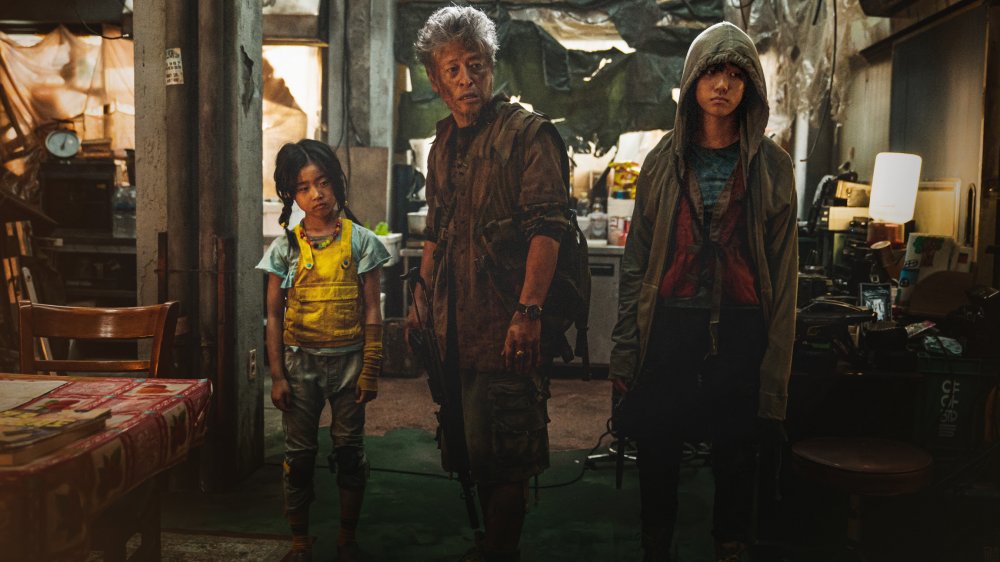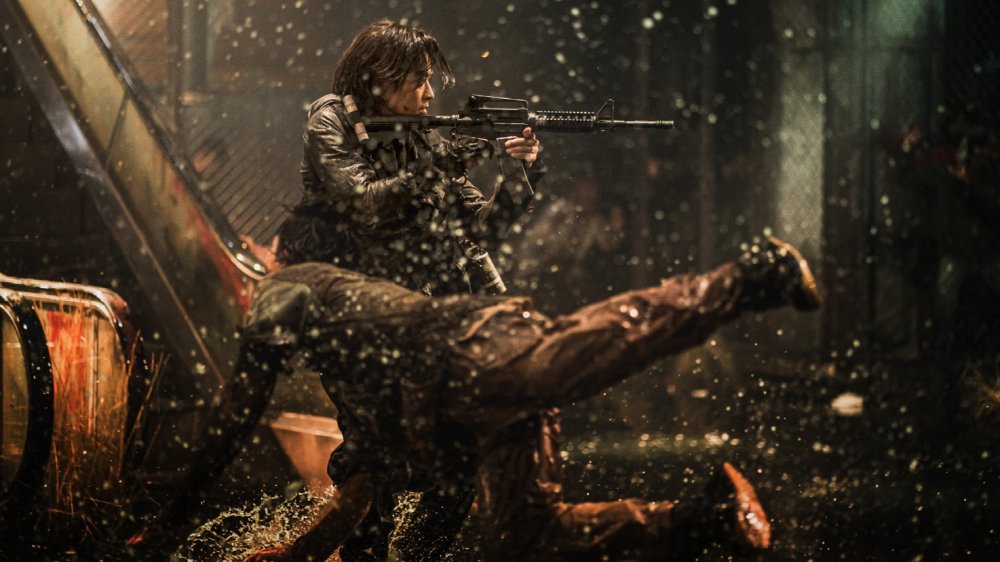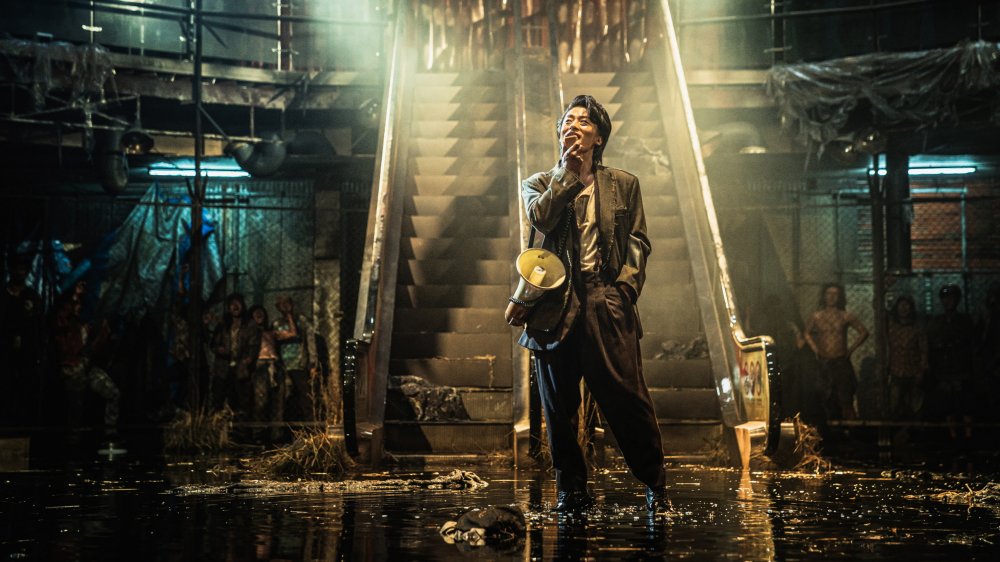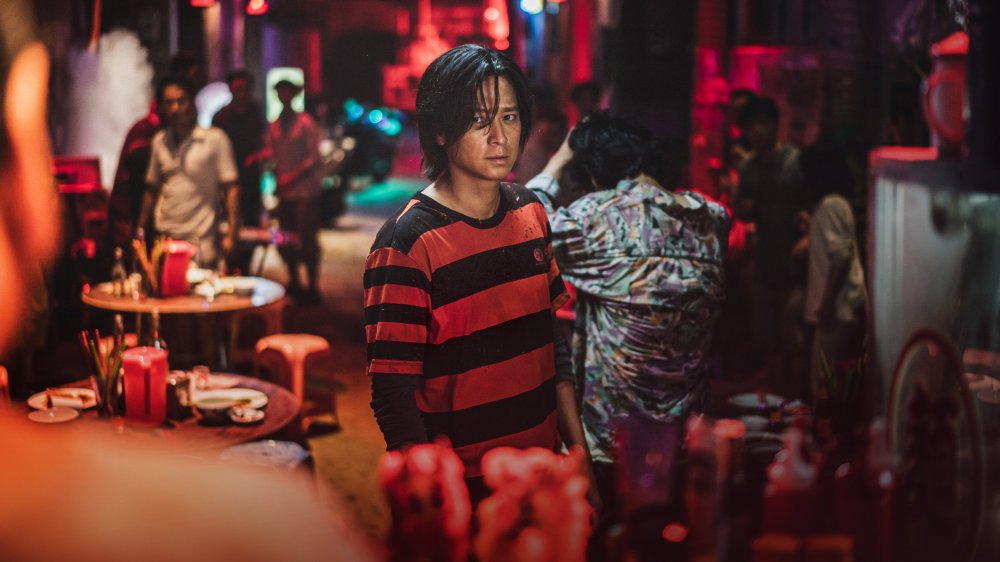The Ending Of Train To Busan Presents: Peninsula Explained
We may receive a commission on purchases made from links.
Contains major spoilers for Train to Busan Presents: Peninsula
Reigning king of the Korean zombie flick, Yeon Sang-ho is finally back with his follow-up to 2016's outstanding Train to Busan. The much-anticipated film reached Western shores on August 21, 2020, and now that we've finally got our eyeballs on the undead sequel, we can confirm that it delivers on every one of Yeon's promises.
This means that Train to Busan Presents: Peninsula is a very different beast than its predecessor. If Train to Busan is Ridley Scott's Alien, then Peninsula is Aliens. Bigger. Badder. Plural. Less seething horror, and more epic adventure. When Yeon told ScreenDaily that Peninsula was inspired by films like George Romero's Night of the Living Dead, Mad Max: Fury Road, and Cormac McCarthy's The Road, he wasn't kidding. Peninsula wears its iconic influences on its sleeve in the best possible way. Where as Train to Busan was a claustrophobic survival film about the early days of a zombie outbreak, Peninsula is an epic adventure into the heart of an established post-apocalyptic landscape.
It's been four years since the Korean Peninsula became quarantined as a result of the zombie outbreak depicted in Train to Busan. No one goes in, and no one comes out. The entire world presumes that the country once known as South Korea now belongs to the dead. A band of Korean refugees scraping together a meager existence in Hong Kong agree to go on a dangerous mission back into the peninsula to retrieve an armored truck carrying $20 million in U.S. bills. A Chinese gang leader facilitates the infiltration and exfiltration in exchange for half of the cash. It's too much money for any of the refugees to pass up, so with former South Korean soldier Jung-seok (Gang Dong-Won) at the head of the expedition, into the zombie wasteland they go.
Jung-seok's mission fractures quickly, and the film's climactic action sequence can be a little much to follow, but that final scene contains more meaning than you might expect upon first viewing. Here's a breakdown of Peninsula's surprisingly optimistic ending, and what it might mean for a potential Train to Busan 3.
Train to Busan Presents: Peninsula is a tale of two groups of survivors
The final sequence of Peninsula is very much a long string of payoffs for plot points that were seeded in the film's first act — in some cases, through very minor details.
With that in mind, to understand the ending we have to unpack the prologue sequence, which features Jung-seok in his military greens around the time of the original Train to Busan. Jung-seok drives his family to board an evacuation ship, as South Korea descends into zombie chaos. On the road to evac, he encounters another family with young children on the side of the road. They beg him for help, but Jung-seok's vehicle is full of his own loved ones, and he doesn't know whether or not he can even secure passage for additional survivors. In a tense scene, he drives past their pleas without even rolling down his windows. Later, an infected passenger reanimates in the passenger hold of the evacuation ship, leading to an outbreak that ultimately claims Jung-seok's sister and nephew. Jung-seok watches them die in the final moments before the time jump.
Four years later, Jung-seok's merry band of refugees return to broken land they abandoned. They dock at Incheon Port and proceed on foot to find the armored truck carrying all those American bills. On the way, they pass a massive horde of zombies contained within what looks like a collapsed portion of a train station with floor-to-ceiling glass windows. They find the money easily enough, but getting back out proves nearly impossible when they are ambushed by a savage group of survivors that uses lights and sound to weaponize the walking dead. Much of Jung-seok's crew is slaughtered at this first point of friction.
The two surviving refugees are separated. Jung-seok's best friend Jooni (Lee Re) is captured by a cruel paramilitary band of survivors led by the sadistic Sgt. Hwang (Kim Min-Jae). He gets taken back to a post-apocalyptic fortress with a decidedly Mad Max vibe where he is painted with a number and forced to compete in a terrifying bloodsport that pits live humans against the undead.
Jung-seok, on the other hand, gets the much better deal. He's taken in by a benevolent family of survivors led by Min-jung (Lee Jung-hyun). In an almost unbelievable case of serendipity, Min-jung is the very same woman that Jung-seok abandoned on the roadside four years ago. Since she and her family risked their necks to save Jung-seok even though he refused to do the same during the evacuation, Jung-seok finds himself indebted to Min-jung, and more specifically — her girls.
The ending proves that Train to Busan Presents: Peninsula is a redemption story
In order to escape the peninsula, Jung-seok and Min-jung's family must retrieve the armored truck and the last working satellite phone so they can dial up their ride for exfiltration at Incheon Port. This pits them against the paramilitary survivors holding Jooni, since they've taken control of both phone and truck. The final sequence is a doozy: one part gun fight, one part car chase, one part drift video, and one part zombie feeding frenzy.
Jooni is killed helping Jung-seok escape the militarized compound. Jung-seok and Min-jung get away with the armored truck, but they are pursued by Sgt. Hwang and his self-serving commanding officer, Captain Seo (Koo Kyo-hwan). Hwang deploys lights and sirens to attract the zombies to Jung-seok and Min-jung, but Jung-seok has one last trick up his sleeve. He fires several bullets into the glass structure we saw teeming with zombies back in act 1, shattering the containment and setting the whole horde on Hwang.
Just as the good guys approach Incheon Port and their rescue ship with the armored truck, Captain Seo appears and attacks. He delivers a stirring speech about his intentions to wipe his own slate clean by escaping with the money and becoming a good man in Hong Kong, just before shooting Min-jung's father (Kwon Hae-hyo) dead. Not the best start to a new leaf. In the ensuing struggle with Seo, Min-jung is shot in the knee. Seo escapes with the truck and the money — and appears to be home free on the exfiltration ship — but the crime lords double-cross him (crime lords don't usually like to share their ill-begotten proceeds), and kill him. We are to believe that this would have been Jung-seok's fate had he successfully returned with the armored truck.
It seems as if Jung-seok, Min-jung, and her daughters are now trapped on the Korean peninsula with no rescue ship forthcoming. Then they spot a U.N. helicopter flying overhead. Min-jung's daughters shoot off fireworks to get their attention, and a handful of U.N. relief workers land to the rescue. Because of the bullet in Min-jung's knee, she's too hobbled to run for the port, so she sacrifices herself to attract the zombies' attention to buy Jung-seok time to escape with her daughters. This might have been enough to square Jung-seok's karma after his callous act in the prologue, but he actually goes back for Min-jung against impossible odds and manages to save her. The whole family is reunited on a helicopter bound for safety.
Train to Busan 3 might take the zombie outbreak global
This ending proves that — unlike Train to Busan — Peninsula is a redemption story. The original movie used archetypes like a wealthy financier and a homeless man with PTSD to demonstrate the way an existential threat — like, say, zombies on a train — breaks down the artificial lines of social stratification that are such a prominent feature of South Korean society. Train to Busan is a small story with an expansive theme, but Peninsula is the inverse: an expansive story with a personal theme. Peninsula uses the lens of Jung-seok's journey to explore what we owe to each other (shout out to ethical philosopher Tim Scanlon). At the beginning of the outbreak, Jung-seok ignores Min-jung because she falls outside his sphere of benevolence. In the midst of an emergency, he chooses to protect his family at the expense of Min-jung's. This selfish act is ultimately rendered moot, when the outbreak on the boat takes his family from him anyway.
When Jung-seok returns to the peninsula four years later, he finds a group of survivors willing to take him in as family even though they share no blood. Min-jung's family, scraping out a life in the middle of the apocalypse, realizes that we are all related by virtue of our shared humanity. That shared humanity instills a certain ethical duty. Jung-seok finally learns this lesson when he runs back into the fray to save Min-jung at the very end. He is redeemed when he recognizes that his own security should not be prioritized over the life of Min-jung.
As for the future of the franchise, the ending of Peninsula provides us with an important and terrifying insight into where Yeon may be going. At the beginning of the film, we're led to believe that South Korea has been completely sealed off from the outside world. The action of Peninsula reveals just how many holes there are in that quarantine protocol. Not only do we see criminals running ships in and out of Korean waters to retrieve stolen cash, but U.N. humanitarian workers are apparently flying regular missions overhead to search for survivors. If the quarantine is porous, and the U.N. is willing to take people off the peninsula and back to gen pop, there's a very good chance that this zombie virus is about to go global.
If Yeon wants to turn things up again in a potential three-quel, the ending of Peninsula certainly lays the groundwork for him to do just that.



